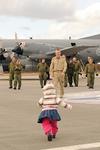Now that most military families live off bases they need better access to services. Frequent moves make it difficult for them to get appointments and professionals may not have the training to provide the special care families need to deal with the stress of military service.
To try to solve some of these problems the military and a non-governmental research institute have teamed up to create a multi-pronged initiative that will also serve to educate the public about the military lifestyle. It’s called the Military Families Initiative and it is a joint effort of the Vanier Institute of the Family and the Military Family Services Program.

Military Families Initiative – Canadian Forces
Service men, women and veterans are younger now than in the past and many have young children. As little as ten years ago the average age of veterans was 65. Now it is closer to 35. Whether they have very young kids or teenagers there are special challenges that come with frequent re-location.
Deployment has increased over the years. Missions in Afghanistan, Haiti and some 40 other countries have left some soldiers with special needs. “Oftentimes when people return from those hostile environments there are some traumatic experiences that they sometimes bring into the household,” said Nora Spinks, ceo of the Vanier Institute of the Family. “We know they may need some mental health services…we need to make sure the entire family gets the support that they need.”
People from various professions were invited to take part in a conference recently to learn about the special needs of service men and women and their families. Educational institutions are being encouraged to provide special training for professionals like doctors, psychologists, early childhood educators and guidance counsellors. Web instruction is being developed as is a handbook.
Huge impact already, says ceo

Returning soldier is greeted by his daughter.
(Corporal Pamela Evans, Canadian Forces)
“We’ve already begun to see some huge action and impact for military families,” said Spinks. “…occupational therapists, social workers, medical professionals, pediatric… they’ve all agreed to in some way, shape or form to enhance their capacity to deliver services to military families. Military families are already feeling an increase sense of community, an increased sense of support.”
The initiative is also dedicated to helping Canadians understand the needs of military families and to destroy the myth that everything is provided to them from housing to medical, education, and other services.
Nora Spinks, CEO of the Vanier Institute of the Family, speaks with RCI’s Lynn Desjardins.
Listen






For reasons beyond our control, and for an undetermined period of time, our comment section is now closed. However, our social networks remain open to your contributions.